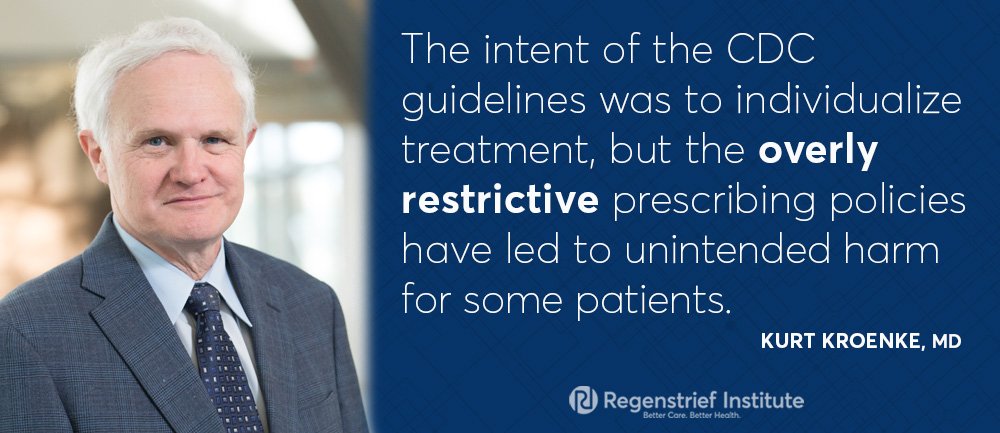The Centers for Disease Control and Prevention is clarifying its guidelines on opioid prescribing, citing the findings of a review panel led by Regenstrief Institute Research Scientist Kurt Kroenke, M.D. Dr. Kroenke and his colleagues found that many clinicians, policymakers and payers are misapplying the CDC’s guidelines, and those actions are negatively affecting patients.
The CDC issued the guidelines in 2016 in response to the increase in abuse of opioid medications. Those recommendations include trying other pain treatments first, limiting opioid doses and prescriptions, and discussing the risks of opioids with patients. The guidelines are not meant to be hard and fast rules.
Dr. Kroenke served as the chair of the American Academy of Pain Medicine Foundation consensus panel created to review the influence of these guidelines on pain management practices. The panel identified several implementation challenges which may be hurting patients.
The panel largely supported the guidelines, but they did find that some clinicians have gone too far in applying them. A number of clinicians and payers have been enforcing hard limits on opioid doses, regardless of the patient’s situation. Other patients have had their prescriptions abruptly tapered or even suddenly stopped, which can have negative consequences. In addition, the recommendations have been applied to patients outside the guideline’s scope, for example, people in active cancer treatment and those dealing with post-surgical pain. The authors also concluded that some policymaking and regulatory bodies have misapplied the guidelines without flexibility, and sometimes, without full awareness of what the guideline contains.
“There are some people suffering from chronic pain who can and do benefit from taking opioids,” said Dr. Kroenke, the first author on the panel’s paper.
“Doctors and clinicians need to be discussing treatment options with their patients and making the decision that is best for those individual patients in the context of safety and pain relief.”
Dr. Kroenke believes acknowledging the issue of misapplying the guidance is an important first step. “The intent of the CDC guidelines was to individualize treatment, but the overly restrictive prescribing policies created by legislatures and payers have led to unintended harm for some patients. Those policies will take time to roll back,” he continued. “In addition, burdens, fears and stigma related to opioid prescribing have been instilled in many clinicians, and that will be even more difficult to reverse.”
The panel developed recommendations to address issues with applying the guidelines. Some of those include producing validated tapering protocol and clarifying the appropriate clinical application of the recommended dosage thresholds based on the individual patient. The proposals are aimed at regulators, policymakers and payers.
The panel report, “Challenges with Implementing the Centers for Disease Control and Prevention Opioid Guideline: A Consensus Panel Report” was published in the April 2019 volume of the journal Pain Medicine. Dr. Kroenke, who is also a professor at the Indiana University School of Medicine, was one of 14 people on the panel.
The CDC’s new guidance was published in the New England Journal of Medicine. CDC officials say they continue to review the policy and its effects and will make changes as they get new information.










